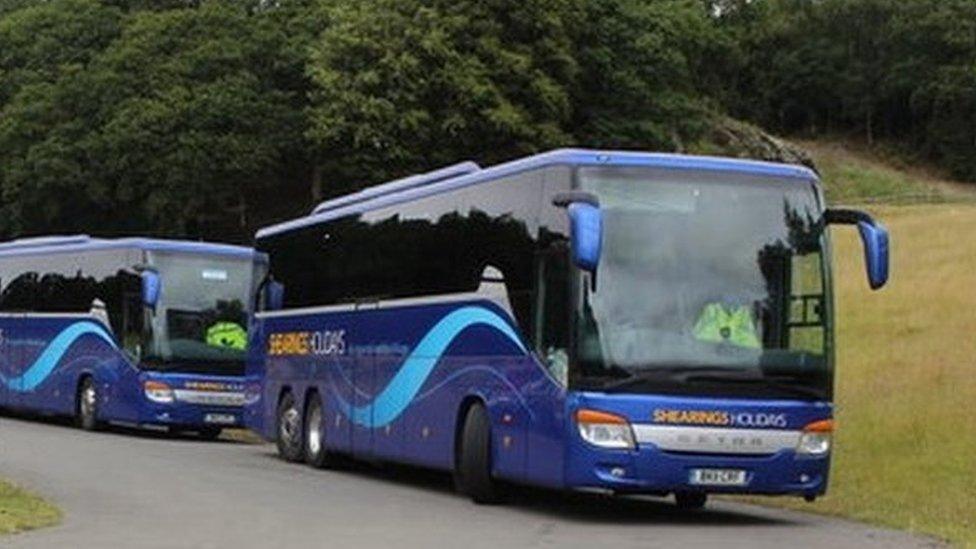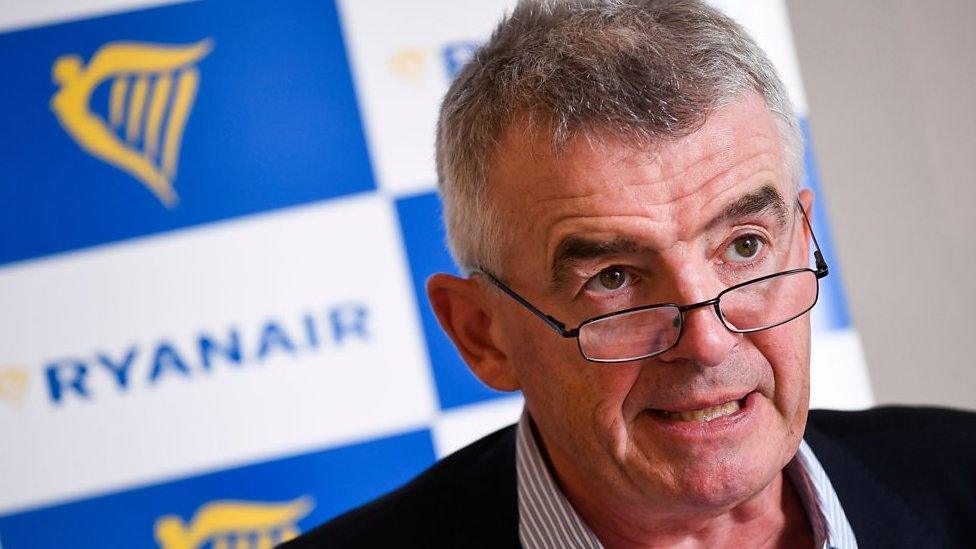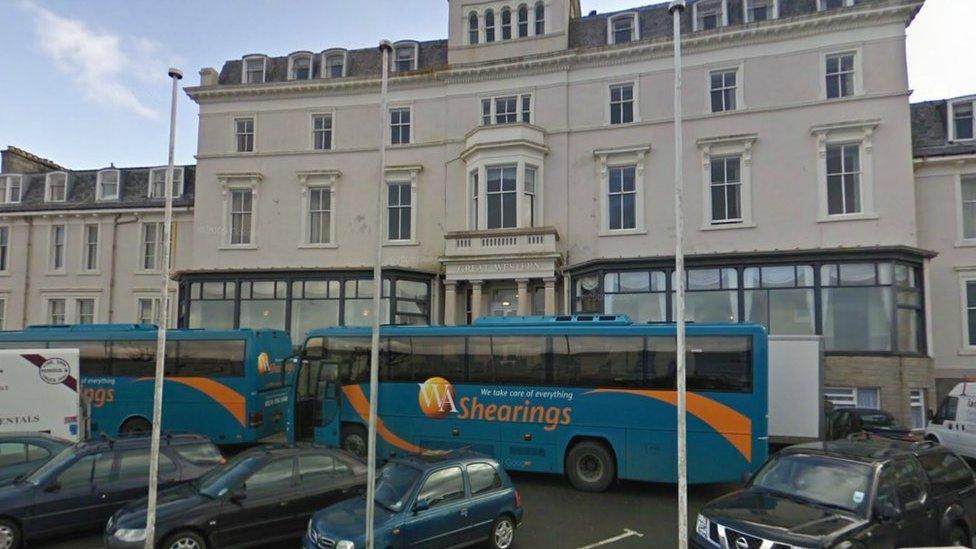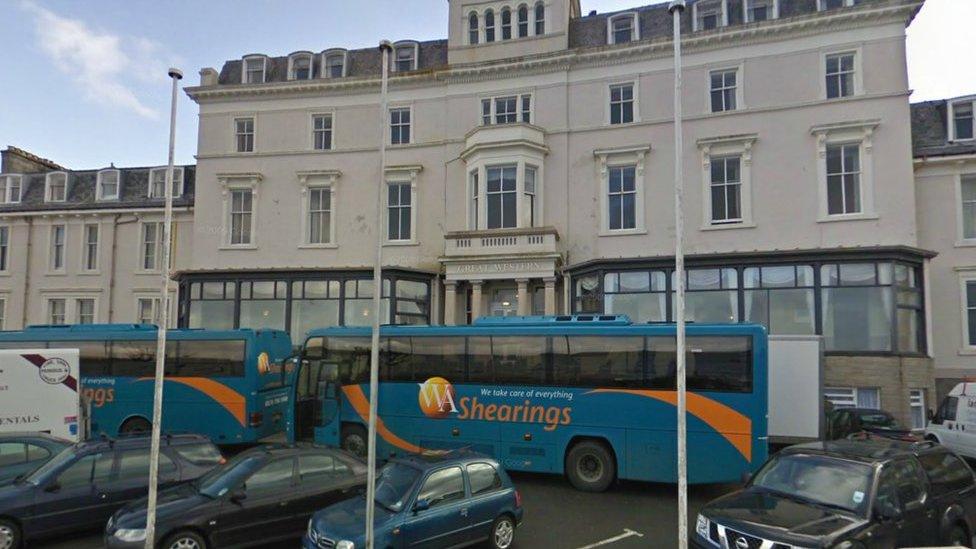Travel firms adopt the brace position
- Published

From airlines to coach holidays, the travel industry has been at the leading edge of the economic crisis, and it's now moving into a grim new phase.
There's pushback against quarantine rules for those on inbound flights and at the tourism sector being put in the later stages of eased lockdown plans.
The collapse of one of Britain's big domestic coach operators will hit hard in seasonal, tourist-dependent towns, and it doesn't look like being an unusual case.
The travel industry has led the way into the Covid economic crisis from the start. With the demise of Shearings and Wallace Arnold coach holidays, it's now showing signs of leading into the next stage - of corporate collapse and job losses, exacerbated by government choices around quarantine and easing of lockdown.
The mood music from across travel - international and domestic tourism - is of increasing desperation and frustration.
It was, of course, aircraft that spread the infection. Taking people home from ski holidays in Italy, air travel spread it across Europe.
Since then, aviation has largely been grounded. Its eagerness to get back into the air is facing major obstacles as governments place the onus on airlines and airports to do the health checks.

Ryanair boss Michael O'leary has attacked the quarantine plans
Airport operators are perplexed, not only at the prospects of having to check passengers for signs of infection, but also as the gateway to mass quarantine as international travellers arrive in the UK and Ireland.
For two weeks, you're supposed to stay at a private address. You can be checked on there, with a £1,000 fine if you've failed to stay locked down. Who checks and follows up? The police don't seem keen.
Whereas airlines have been compliant in accepting lockdown, the new stage is seeing increasing friction around the easing process.
Always to the fore in ridiculing government rules, Michael O'Leary at Ryanair says quarantine proposals are "unexplainable, ineffective, and unimplementable".
Al fresco
Others in the travel industry are urging governments to stay true to their claims that they're following the science, because they can't see the evidential basis for new guidelines on easing lockdown.
While other business lobby groups want to work alongside governments to nudge them into an understanding of companies' needs, there's a whiff of revolt and anger around tourism.
The Scottish Tourism Alliance is blunt, saying that the industry simply faces collapse unless there is support from government, either to increase the flow of emergency funding or to ease restrictions on travel, eating and drinking.

Author Neil Gaiman apologised for making a trip from New Zealand to Skye
Being told in the Scottish government's route map, external away from lockdown that those with outdoor eating and drinking options will be able to open first has only increased the frustration. For well-known reasons, investment in al fresco dining options has not been a priority for Scottish tourism.
At the UK Hospitality trade grouping, Scottish director Willie MacLeod says the route map "will do more harm than good. It appears not to be based in any logic and has the potential to create a two-tier sector with many already-hammered businesses being left behind".
It's argued that grocery, pharmacy and pet food stores have shown the way in making physical distancing work indoors, so the lessons can be applied more widely.
There's also concern within the sector that the "keep out" message from rural communities - given international media prominence in the case of author Neil Gaiman's journey from New Zealand to Skye - is not helpful, and should be changed to a less blunt "come back later, please".
Coach costs
There is frustration, too, that grants for tourism firms don't apply for larger premises, with rateable value (estimated annual rental cost) above £51,000. That rules out a lot of hotels. The Scottish government could raise that threshold to expand its grant-giving, if it can find the money. It's looking to the Treasury in London to take the lead.
The options available for larger firms, going further into debt, don't look attractive even with government guarantees behind the loans and payments for year one, when company bosses cannot see a path to reliable revenue this year or next.

The Bay Great Western Hotel in Oban is one of the hotels affected
Some are reliant on the tourism industry, but don't get the benefit of that sector's rates holiday. Coach companies say they're more stuck than most. They're not bus operators, so they're not getting a huge tranche of funds to compensate for the loss of passenger revenue. Nor are they much helped by a business rates holiday, because their assets are on wheels. And their main sources of revenue have dried up: tourism, schools and football fans.
That brings us to the collapse of Specialist Leisure Group, including Shearings, Wallace Arnold, Caledonian Travel and 44 hotels.
Seven of those hotels are in Scotland, and they're not just any hotels. From the Pitlochry Hydro to Portpatrick, Oban, Fort William and Strathpeffer, the hotels caught by this corporate collapse are among the biggest in tourist-dependent towns.
Not only are 2,500 people being made redundant across the company and across the UK, after most of them were already furloughed: the impact is on suppliers of food and drink, and the numerous small firms that sell to the coach-travelling holiday-maker; cafes, ice-cream stands, gift shops, visitor attractions. All the towns affected are tourist dependent, and seasonally so.
The company's customers are dependent also on such coach operators running budget trips, aimed at those of modest means, particularly retirees. That loss of capacity is a blow to travellers too.
Distressed assets
The company collapse results from customers demanding refunds on their holidays, quite reasonably. But without any revenue, travel firms like Specialist Leisure cannot pay out on the scale required.
Firms that have tried to fob off claimants with vouchers are being strongly criticised within the industry and by consumer advocates. We now see the effect of applying consumer rights rigidly - the company has gone.
The assets will probably be bought out of administration. There will be some low prices. There will be opportunities to start up those hotels again. But not yet. Probably not this year, and there are big doubts about 2021.
Credit may be eased to help existing companies, but that doesn't mean it's going to be easy to secure for new start-ups, or for those wanting to expand by taking on distressed assets.
Specialist Leisure Group does not look particularly unusual or unlucky. There's a lot more of this to come.
- Published23 May 2020
